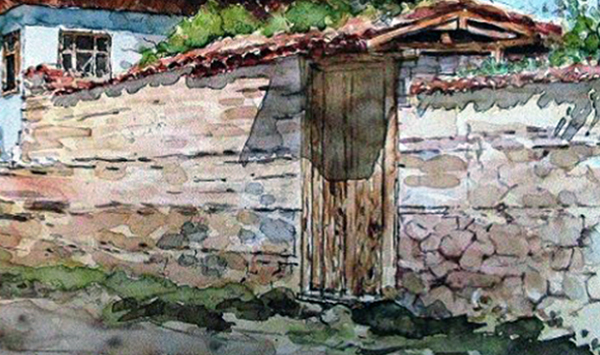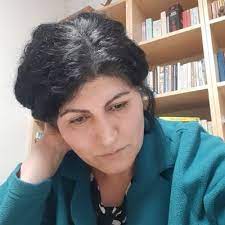Türkçe Nupel | Français | English
Previous part / 1 | 2 | 3 | 4
Every household had its altruist, every family a sacrificed one. In this ancient courtyard, İsmail was the charitable one sacrificed to a large family. He was the one bearing the weight of the entire family, the one who felt responsible for them all.
Leaving a sunny springtime for a land in a cold, snowy, foggy winter, such was life in Germany for İsmail. Separating from his village, his country, being scattered as an emigrant, this transformed İsmail’s spring into a harsh winter. On the one hand, the lack of Şengül’s love, on the other, his neck under the material and affective yoke of the courtyard’s occupants. At first, he shared a single room with four friends. The hardes(, most difficult, dirtiest jobs awaited him in Germany. Factory worker during the week, he worked in the vineyards on weekends. He took the bit between his teeth so as to buy the tractor he had promised his father..
He saved on his sleep time, he saved on his meals, on his clothes. He sent money regularly to his father. And through all this, he never forgot to send letters filled with love, written on pages with burnt corners. Finally, he settled in a two-bedroom appartment with a fellow from his country, and in this way, Şirin’s photo could come out of the suitcase and finally breathe up on the wall. İsmail drew all his strength, all his conviction, from this photo. Şengül was the talking, moving, touching version of this photo. But in this land of exile, his only confidante was this inanimate photo of Şirin, dead, lifeless.
Two endless years went by this way, with only a temporary break when one spring morning, amid newly awakened songbirds, İsmail knocked on the door to the big courtyard. Embraces, tears of joy, he was greeted with gratitude. Like a dried out tree in the desert, drooping through lack of water, İsmail leaned thirstily toward Şengül. His daughter Şirin had much grown also. Oh, such a great happiness it was, to be together again after this forced time afar, to be reunited again in this courtyard.
That very afternoon, Seydali gathered his sons in the courtyard First he prayed, and expressed his gratitude to İsmail. Then he announced the good news to the courtyard, with pride and joy: they would be buying a tractor. The following day a brand new, fully equipped red tractor stood in front of the door.
They hung a horseshoe on the front of the engine. And, a bead against the evil eye. Every possible wish was expressed for it to bring good luck, fertility and abundance to this courtyard. Their hopes, their expectations were thus gathered together. The red vehicle in front of the door was now the apple of the eye for the whole family, the door opening on prosperity.é.
But İsmail had to return to Germany in a month. The family’s dream of prosperity would not take shape after two years. Who would drive the tractor? Who would teach the brothers how to use it? Who would handle its maintenance? They also found answers to these questions. There was a relative in a town close by. “Moreover, he was a young man, clean, honest, as sturdy as a lion. He could do everything. He had also worked as a driver for years. Why pay a stranger when Mahmut was there ? If a miserable one could earn his bread, for the love of God…”
And so the door to a new room opened out on the courtyard. A plate was added to the table. Mahmut was young, handsome, self-confident… The month went by in the blink of an eye and İsmail left. With the weight of the entire family on his shoulders, he covered the thousands of kilometers again. Before before leaving, he addressed a prayer to his father:
“That Şengül not be sent out in the fields, to the harvest, that she might not be broken, crushed…”
Such was his wish. Was he not being crushed and broken in her place? Seydali did not raise any objection. Was not the bread they ate brought to them thanks to İsmail’s labor, to his sweat. Had İsmail not left Şengül in their care?
And how Seydali loved Şengül…
*
Mahmut soon became the star of the courtyard. He was a mechanic, knowledgeable, resourceful and efficient, someone who was calm and reserved. Seydali gave him as much importance as he did to his own children. Everyone cherished him. Up to that point, all was well. Was this not how it was supposed to be?
But, wandering through the courtyard there was a young gazelle, so beautiful as to drive someone mad. Mahmut was transformed. The admiration for Şengül’s exaquisite beauty awoke in Mahmut, over time, it became a burning fire, an impossible love. If Mahmut did not catch a glimpse of Şengül in the day, his life melted away like a candle.
Sometimes, in the cool evening, he played the saz1for the tired occupants of the courtyard. All these songs filled with emotion delighted the inhabitants. Their admiration grew even more. And there was one of the songs… to be honest, it was always sung for Şengül.
“Zülf- ü Kaküllerin Amber Misali…” (You amber-like curls). This love song, full of melancoly how could it not stir the heart of the courtyard’s inhabitants. Of course, it would touch the heart of everyone, and that of Şengül also….
Once he was finished with the tractor, Mahmut ran after Şengül, who stayed home alone to take care of the kitchen and other housekeeping chores. Sometimes using the excuse of tending to the motor, sometimes an oil change, he invented a thousand excuses, even if it meant sweating over kilometers for a single one of Şengül’s smiles. Talking with her, even exchanging a single word by asking her for something, brushing against her, feeling her breath on his heart, this had become his deepest desire.
At that time, Şengül was expecting her second child. And she awaited İsmail’s letters impatiently, smelling them, kissing them. She found consolation in telling herself over and over again that it was only for two years, that the time would pass quickly.
Time went by, as it always does. The Inner fire grew in Mahmut, became greater… Şengül’s birth cries offered up a little boy to the courtyard. In one of his letters with the burnt corners, İsmail had written “if it’s a boy, his name will be Emre”. No one objected..
As if digging a well with a needle, as if filling a lake by drawing water with his mouth, Mahmut stealthily, step by step, managed to grab Şengül’s attention. He whispered that he sang “your amber curls” just for her. Henceforth, this song was theirs, a secret that belonged only to the two of them.
A kind of coldness crept into the letters Şengül sent to İsmail, a distance. They were letters that seemed to be written under the threat of a firearm. İsmail was not wrong in sensing this because Şengül had also begun to love Mahmut, was steering her heart toward Mahmut’s port of call.
For the first time, with Mahmut, Şengül experienced what it was to be in love, she discovered how one can love, can tremble with emotion. This was the first time love had bewitched her, carried her away on a cloud. Şengül was afraid, mortally frightened. She also felt pity for İsmail but, no matter what she did, she couldn’t keep herself from loving Mahmut.
*
İsmail had taken a decision. He was going to bring Şengül and his children close to him in Germany. He preferred interpreting Şengül’s coldness as being caused by work in the village, the land, the dust… even though reality was something else entirely.
“You were a child, a child. Would you have stretched out in your big sister’s bed otherwise?”
“He took your breath of life and put it in your sister’s body. You are not the one he loves, he still loves your sister. I’m the one you loves you and you also love me, this is what love is” said Mahmut.
These whispered conversations, gazing at one another, gave way to innocent touching, to pure kisses, Şengül’s reason was abandoning her. With time, the desolate courtyard became the theater of their union filled with ardent desires. In this courtyard a secret love blossomed, rising up between its walls, a love unsuspected by everyone, a love no one heard nor guessed at.
As if he was an essential member of this courtyard, Mahmut ran to every job, he made himself indispensable in Seydali’s eyes. The yard needed to be widened, kept up, cemented and covered. İsmail delayed his return a bit longer for this reason. An unavoidable help, Mahmut contributed to the building. He received a generous payment for it, out of the money sent by İsmail.
And what about Şengül? She wandered like a love-enchanted phantom, she secretly met up with Mahmut…It went on like this for a while… Then, one afternoon, a letter arrived from İsmail. From that day on in the courtyard, Şengül and Mahmut’s faces changed. İsmail was coming back. Then he would bring Şengül and the children with him to Germany.
“It couldn’t go on like this”, he needed his family with him, he had become accustomed to Germany. “There would definitely be no further return…”
With this news, dismay fell on Şengül’s heart. “What will happen now?” she asked Mahmut. “What, now?” Mahmut kept silent. He didn’t say a single word. One afternoon, he managed to find an opportunity, he took Şengül’s delicate hands into his, and said:
“I love you, but I have no solutions, they will not let us live, neither one of us, they won’t allow us to breathe, let it go, time solves everything…”
Şengül collapsed, there, in the courtyard. So there was also an end to the march toward paradise? Reality now stood upright in all its nakedness. At that moment, a fear that had never left her came back with renewed force.
The following day, Mahmut was no longer there. He had “an unexpected emergency” and had already started on the road back to town. In any event, İsmail’s brothers had learned to use the tractor, more or less. Seydali said prayers for Mahmut, his wife repeated them.
“May the god bless you, may your road and your fate be open…”
Şengül was nothing but a hollow tree, a snake in a tree, a bird in the snake’s maw. A bird on the verge of giving up its soul. Never had she experienced such fear, such despair. “If İsmail learned about it, if the ones from the courtyard found out, if Seydali heard, if everyone knew…”
Fear, anguish, distress, her conscience raking her to the quick… As if, with Mahmut gone, the enchantment had snapped immediately. Reality, how cruel it was.
Şengül stood up, headed toward the çarka. Inside it, there were jugs of water, sufficient for the whole courtyard family. She locked the door, undressed. With a cup, she poured the ice cold water on her head, she washed, hitting herself all over. Nothing could cleanse her inner self. She couldn’t control this feeling that made her shake from head to foot.
A child’s cry in the night spread over the courtyard.
Her son Emre was crying. He was crying as if consumed for his mother, as if lamenting for her.
Next part / 1 | 2 | 3 | 4
Translation from French by Renée Lucie Bourges
Support Kedistan, MAKE A CONTRIBUTION.


